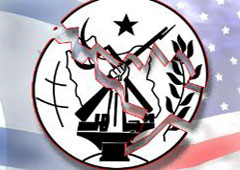many years, the roughly 3,500 members of the Iranian dissident group Mujahedin-e Khalq (MEK) living quietly in Iraq drew little attention. But now the relatively obscure group is at the center of an increasingly contentious argument among leaders in Baghdad, Tehran and Washington, where decisions the new White House makes about the rebels will probably set the tone for U.S. relations with Iran in the near term.
relatively obscure group is at the center of an increasingly contentious argument among leaders in Baghdad, Tehran and Washington, where decisions the new White House makes about the rebels will probably set the tone for U.S. relations with Iran in the near term.
 The simmering issue of the MEK’s fate flashed into the open earlier this month when Iraqi Prime Minister Nouri al-Maliki unexpectedly declared that the group would no longer be allowed to remain in Iraq. Shortly after that, Maliki’s national security adviser, Muwaffaq al-Rubaie, said the MEK’s camp roughly 40 miles north of Baghdad would be disbanded within two months, declaring during an appearance in Tehran that Iraq would not play host to threats toward its neighbor.
The simmering issue of the MEK’s fate flashed into the open earlier this month when Iraqi Prime Minister Nouri al-Maliki unexpectedly declared that the group would no longer be allowed to remain in Iraq. Shortly after that, Maliki’s national security adviser, Muwaffaq al-Rubaie, said the MEK’s camp roughly 40 miles north of Baghdad would be disbanded within two months, declaring during an appearance in Tehran that Iraq would not play host to threats toward its neighbor.
The issue grew more complicated on Jan. 26, when the European Union removed the MEK from its list of terrorist organizations, a roster that includes organizations such as Hamas, Palestinian Islamic Jihad and the Revolutionary Armed Forces of Colombia (FARC). The E.U. move, which came after a long lobbying campaign by the MEK’s supporters in Europe, sparked an outcry in Tehran. About 300 people were gathered around noon on Wednesday in front of the British Embassy in Tehran to protest the E.U. decision. Some in the crowd threw stones at the embassy, while others held up shoes on sticks in a show of deep disrespect in the Middle East.
"What people side with the enemy and kill their own people in a war?" said demonstrator Sina Zamanian, 17, referring to the MEK’s alliance with Saddam Hussein during the Iran-Iraq war, which led them to settle in Iraq. "They are the worst kind of opportunistic terrorists and should be forever marked as such."
Nevertheless, some in Baghdad are calling for the group to be allowed to remain in Iraq, or at least to not be turned over to Iran, for political reasons. "We have to deal with this issue very delicately," says Ayad Jamal al-Deen, an Iraqi parliamentarian aligned with Shi’ite cleric Muqtada al-Sadr. "I’m not here to defend this organization. I have no interest in them. But I am looking out for the Iraqi national interest." Al-Deen and other Iraqi political figures see the group essentially as a bargaining chip with Iran, one of the few Iraq holds against its powerful neighbor. They argue that simply shuttering the MEK camp as Iran demands squanders what precious little leverage Iraq has against Iran. Al-Deen adds, "In my opinion, Iraq has only this card, MEK, to pressure Iran."
At the moment, however, the MEK’s ability to remain in Iraq depends on the will of the Americans. The Bush White House continued to use the military to protect the MEK at Camp Ashraf despite its current status as a terrorist organization on the U.S. list and periodic complaints by the emerging Iraqi government and Tehran, which says the group is still involved in subversive activity inside Iran. Outwardly, U.S. officials have said disbanding the camp would be in contravention of international humanitarian law because the group’s members are likely to face persecution in Iran or Iraq. But many Iraqis and Iranians suspect that the U.S. keeps the camp open for intelligence purposes, since the MEK’s spy network played a key role in uncovering Iran’s secret uranium-enrichment program in 2002.
Maliki appears intent on pressing the issue anew with the Obama Administration, which will have to decide soon whether to keep offering U.S. protection to the group or to yield to Iraqi demands to close Camp Ashraf. If the White House allows the Iraqi government to close the camp, the Iranian leadership is likely to see the move as a sign that the new Administration is eager to ease tensions between Washington and Tehran. A continuation of the status quo, however, could chill Obama’s early outreach efforts.
At Camp Ashraf, MEK members simply wait for word on what may happen to them as discussions continue in Baghdad, Tehran and Washington. Shahriar Kia, a spokesman for the group, says a closure of the camp would be a disaster for those living in what amounts to a protective quarantine for roughly the past seven years. "Closing down Camp Ashraf and the displacement of its residents, who are protected by the Geneva Conventions, against their will is a war crime," says Kia. "This will cause a humanitarian catastrophe."
— With reporting by Tariq Anmar in Baghdad
By Mark Kukis / Baghdad
http://www.time.com/time/world/article/0,8599,1875917,00.html

